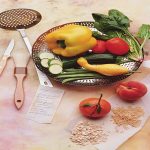
Cooking healthy at home is one of the best things you can do for yourself and your family. And your budget doesn’t have to take a hit when you stock up on this list of good-for-you foods. When it comes to produce, it’s often easier to save money when buying in season, but many vegetable staples are affordable year-round. Stock these superfoods in your fridge’s vegetable crispers. They form the flavor base for many recipes. Vegetable Basics Bell and hot peppers Cabbage Carrots Celery Garlic Mushrooms Onions Add to the list with a variety of greens such as baby kale, baby spinach, watercress and prewashed mixed salad greens. Whether used as the fixings for a full meal or a filling side dish, greens add vital nutrients to your diet. For lean protein, affordable choices include chicken, ground turkey, tilapia and frozen shrimp, which is usually much less expensive than fresh. Lean beef stew cubes are another economical healthy protein good for soups and chili. So are legumes — beans, lentils and split peas. Canned beans might seem inexpensive, but bags of dried beans that you soak and then cook are far more affordable. You can also find more varieties when you buy them dry, if not at your supermarket then at online stores. For whole grains, choose short grain brown rice, brown rice noodles and… read on >


























-300x200.jpg)







-300x169.jpg)
